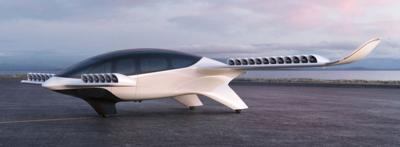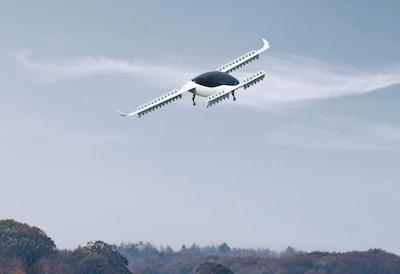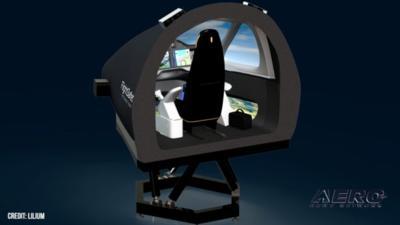Seven Shells for Seven Test Aircraft
Lilium GmbH, the German aerospace concern, has commenced assembling fuselages for its Lilium Jet—an eVTOL personal air vehicle the company asserts remains on track for a late-2024 maiden flight.

Fuselage assembly instantiates a tangible manifestation of Lilium’s ability to see its planned eVTOL proceed from conceptualization to actualization. The fuselage currently under construction is the first of seven such structures salient to the near-term assemblies of seven flight-test and certification iterations of the Lilium Jet.
Lilium chief operating officer Yves Yemsi stated: “We’re delighted to kick off assembly of the first Lilium Jet fuselage at Aciturri, bringing us one step closer to reshaping sustainable regional air mobility. We see this as further evidence that our approach of teaming with proven aerospace suppliers to bring our cutting-edge eVTOL aircraft to market is the optimal strategy as we advance along a path to certification and entry into service of the Lilium Jet.”
The Lilium Jet’s fuselage was developed in collaboration with and is being built by tier one aerospace supplier and Lilium strategic partner Aciturri at the latter’s facilities in Valladolid, Spain. The fuselage is slated for delivery to Lilium’s Wessling, Germany facility in 2023’s fourth-quarter, where assembly of the first Lilium Jet will be completed, ostensibly, prior to year’s end.
Lilium CEO Klaus Roewe set forth: “This phase is more than just a technical step; it’s a clear signal to all Lilium stakeholders of our commitment to making regional air mobility more efficient, enjoyable, and sustainable. As we assemble the fuselage, we are also crafting a transformative flying experience while upholding our promise of unparalleled efficiency, comfort, and safety.”

A Lilium investor and aerospace supplier boasting nearly fifty-years’ experience in commercial aircraft programs—including the design and manufacture of major airframe components germane to Airbus’s A350, A320, and A400M models; Boeing’s 787; and Embraer’s KC390 programs—Aciturri, in cooperation with Lilium, green-lighted the initial industrial production components and processes by which the Lilium Jet will be built. As well as supporting industrialization of the Lilium Jet, Aciturri will, in the coming years, continue to support the inchoate eVTOL’s design optimization and certification processes.
Aciturri Aerostructures CEO Maria Eugenia Clemente remarked: “Aciturri is committed to playing a leading role in the transformation of sustainable regional air mobility, which supports Europe’s goal of achieving climate neutrality. We are fully aligned with Lilium’s vision and design, and we are delighted to have evolved our partnership to such a foundational stage towards the birth of the Lilium Jet.”
Broadly, the Lilium Jet is a seven-seat eVTOL, the lift scheme of which features no fewer than 36 articulating, ducted, electric, vectored-thrust motors installed in the aircraft’s aft-wing and forward canard. Lilium’s rationale for the Jet moniker derives of the vessel’s rotors being encased in nacelles. In point of fact, the Lilium Jet’s thrust architecture comprises ducted fans; the machine is not—as evinced by its advertised 161-knot maximum speed and 135-nautical-mile single-charge range—a true jet aircraft.

In January 2020, German civil aviation magazine Aerokurier published a report alleging Lilium could not meet its stated aircraft performance goals, and the Lilium Jet would, in fact, be capable of flying for only two-minutes at a time. The anonymously-authored report was dismissed by Lilium but later backed by four German aerospace academics who collectively contended Lilium was "using brilliant PR to create an illusory world to attract investors."
In February 2021, Forbes published an article citing a number of former Lilium employees who claimed the Lilium Jet’s development had been "dogged by problems.” The individuals in question stated, also, that the eVTOL’s flight-test campaign had occasioned minimal progress toward a viable platform.
Controversy notwithstanding, Lilium’s books presently bulge with orders for 745 Lilium Jets bound for U.S., European, Asian, Middle Eastern, and South American customers.
 ANN's Daily Aero-Linx (05.06.25)
ANN's Daily Aero-Linx (05.06.25) ANN's Daily Aero-Term (05.06.25): Ultrahigh Frequency (UHF)
ANN's Daily Aero-Term (05.06.25): Ultrahigh Frequency (UHF) ANN FAQ: Q&A 101
ANN FAQ: Q&A 101 Classic Aero-TV: Virtual Reality Painting--PPG Leverages Technology for Training
Classic Aero-TV: Virtual Reality Painting--PPG Leverages Technology for Training Airborne 05.02.25: Joby Crewed Milestone, Diamond Club, Canadian Pilot Insurance
Airborne 05.02.25: Joby Crewed Milestone, Diamond Club, Canadian Pilot Insurance





